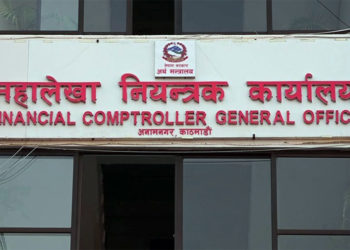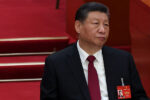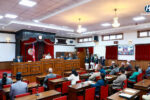KATHMANDU: Economic Digest offers a concise yet comprehensive overview of significant business happenings in Nepal, presented in easily digestible summaries.
Nepal plans to export 10,000 Megawatts of electricity in next decade
Prime Minister Pushpa Kamal Dahal ‘Prachanda’ urged the private sector to invest in Nepal’s hydropower industry, assuring them that an agreement has been reached with India to export 10,000 megawatts of electricity from Nepal over the next ten years.
The goal of exporting 10,000 megawatts of electricity in a decade signifies Nepal’s intention to become a major player in the energy market, potentially boosting its economy and enhancing its geopolitical significance.
The Prime Minister emphasized that achieving this target would mark a significant milestone in Nepal’s journey towards prosperity and highlighted that a long-term agreement has been signed with India for the export of 10,000 megawatts of electricity over the next decade.
NEPSE wraps up week with a 2.67 percent increase
The NEPSE Index concluded the week at 2,018.76, marking a gain of 52.53 points or 2.67% compared to the previous week’s close at 1,966.23, which had seen a decline of 1.64%.
The increase reflects a positive sentiment in the market compared to the previous week’s decline. The higher volatility observed this week suggests increased market activity and potential opportunities for traders.
Throughout the week, the index fluctuated between a high of 2,048.23 and a low of 1,962.21, exhibiting a total volatility of 86.02 points, notably higher than the previous week’s volatility of 45.56 points.
The substantial turnover of Rs 18.59 billion indicates significant trading volume and investor participation in the market. This heightened activity could be attributed to various factors such as economic news, corporate earnings reports, or geopolitical developments.
Gold price drops by Rs 700 per tola in Nepali market
The price of gold and silver in the domestic market of Nepal experienced a significant drop. According to the Federation of Nepal Gold and Silver Dealers’ Associations, the price of hallmark gold has decreased by 700 rupees per tola, reaching Rs 139,300 on Friday compared to Rs 140,000 the previous day.
Similarly, worked gold also saw a decline from Rs 139,300 to Rs 138,650. Additionally, the price of silver dropped by five rupees to Rs 1,800 per tola.
This drop in prices could be influenced by various factors such as changes in international market trends, currency fluctuations, or local demand-supply dynamics.
NRB maintains stability in third-quarter Monetary Policy review
The Nepal Rastra Bank released its third-quarter monetary policy review, opting to uphold stability by refraining from significant alterations.
The report noted a decrease in both current and capital expenditures of the Nepalese government compared to the previous year. Despite this, revenue mobilization has increased, indicating a relatively balanced fiscal situation.
The anticipation of higher public spending in the fourth quarter suggests a potential uptick in expenditures by the end of the fiscal year. As of the end of Chaitra 2080, the Government of Nepal experienced a decrease of 8.9 percent in total current expenditures and 9.2 percent in capital expenditures compared to the previous year.
However, revenue mobilization has seen a 9.4 percent increase, and internal borrowing from the market has nearly met its target, resulting in a contractionary stance in net public finance operations. With a trend indicating higher public spending in the fourth quarter, it is anticipated that public expenditures will rise by the end of the current fiscal year.
Nawalparasi revenue surges to Rs 21 billion
The revenue collection of Rs 21 billion in Nawalparasi (Bardaghat-Sustapurba) during the first 10 months of the fiscal year reflects strong economic activity. The contribution from the Inland Revenue Office in Kawasoti, totaling Rs 20.33 billion, suggests significant taxpayer compliance.
Out of the total revenue, Rs 20.5 billion is allocated to the federal government, while Rs 452 million goes to the Gandaki Province Government, highlighting the decentralized fiscal structure of Nepal.
Cheque bounce cases surge in Kaski
The surge in cheque bounce cases in Kaski District, from 517 in fiscal year 2022/23 to 717 in the first 10 months of 2023/24, reflects a concerning trend, as highlighted by SP Mohan Kumar Thapa of the District Police Office. While verbal complaints suggest a much higher incidence, totaling around 8,000 cases, the police lack the resources to investigate them all thoroughly. The rise in bounced cheques is attributed to various sectors, including real estate, vehicles, foreign employment, cooperatives, and business transactions. Measures such as blacklisting offenders and freezing assets aim to deter such practices, but concerns remain about the impact on businesses and individuals.
Rise of informal cross-border trade raises economic concerns between Nepal and India
The surge in informal cross-border trade between Nepal and India, particularly in agricultural products like rice, has raised concerns about its economic impact and the challenges it poses to formal trade channels. Research indicates that this informal trade has flourished due to various factors, including tariffs and export bans imposed by India, as well as price differentials between the two countries.
The dominance of a small group of traders and the involvement of syndicates with political backing in informal trade raise questions about governance and market regulation. Despite discussions at various levels, concrete solutions to control informal trade have yet to be implemented.
(Compiled and prepared by Srija Khanal)
Economic Digest is a daily morning economic digest, basically relatable summations of the most important business news, and happenings from Nepal into easy-to-understand summaries.









Comment